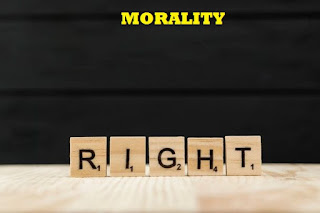What Is Morality?
What Is Morality? Ibn Atsir mentions "al-khuluqu" and "al-khulqu" in An-Nihayah (2/70), meaning dien, habits and attributes. The essence is the inner portrait of man, namely his soul and personality.
From the above statement contained several benefits:
Humans are composed of born and inner, physical and spiritual, therefore we should not treat humans like robots or inanimate objects that have no feelings.
Just as the body needs food and drink, so the spiritual needs food and watering in the form of knowledge, faith and good deeds. Imam Ahmad bin Hambal Rahimahullah said that, "humans need food once or twice a day and need knowledge in a day as much as a sigh."
We must have serious attention in trying to improve our morals because human value does not lie in physical form, tribe, descent, academic degree, position or wealth, but lies in one's faith, piety and morals.
Allah Ta'ala said:
"Indeed, the most honorable among you in the sight of Allah is the most pious among you." (Al-Hujuraat: 13)
Rasulullah Shalallahu 'Alaihi wa Sallam said:
"Indeed, Allah does not pay attention to your appearance and property, but Allah pays attention to your hearts and deeds."
The Arab poet said:
O bodily servant
How long have you worked for his benefit
You have troubled yourself
For a real loss
Turn your attention to the spiritual
And perfect its virtues
With the spiritual, not the physical
You are perfect to be human
There are also other opinions on the definition of morality ; some say that good morals are giving, not hurting others and resilient in the face of suffering.
Others say that good morals are to do good and refrain from evil. Others say, "Throw away the vile attributes and adorn them with the noble attributes."
This is mentioned by Al-Imam Ibn Qayyim Al-Jauziyyah Rahimahullah in his book Madarijus Salikin.
Imam Ibn Qudamah Rahimahullah mentioned in Mukhtahsar Minhaj Al-Qashidin, that morality is an expression of the condition of the soul, which can so easily produce deeds, without the need for thought and consideration. If the deed is good, then it is called good morals, if bad it is called bad morals.
Morality can also mean dien (religion) as God says:
"And indeed you have great morals." (Al-Qalam: 4)
Ibn Abbas Radhiyallahu 'Anhuma said about the above verse, which is the great dien (Islam). Mujahid, Abu Malik, As-Suddi, Rabi bin Anas, Adh Dhahhak and Ibn Zaid said the same.
It is found in Sahih Muslim that Aisha Radhiyallahu 'Anha was once asked about the morals of the Prophet sallallaahu' alaihi wa sallam and he replied, "The morals of the Prophet sallallaahu 'alaihi wa sallam is the Qur'an."
All the commands found in the Qur'an he carried out all and all the prohibitions found in the Qur'an he left.
Shaykh Salim Al-Hilali said, "With this it becomes clear that the great morality in which the Prophet sallallaahu 'alaihi wa sallam is characterized by it is a dien that includes all the commands of God and
His prohibitions so hasten to carry out all that God loves and pleased- Him and stay away from everything that He hates and angers willingly and openly. ”
From some information about the meaning of morality we conclude that the word 'morality' has a wide scope, which includes morality to God and morality to creatures; only that we often find the use of the word 'morality' meant by the speaker or writer in a narrow sense, that is limited to the behavior of fellow beings.
To be able to know which meaning the speaker or writer wants must be seen from the context of the sentence so that we can distinguish it.
Source: Book "Moral Workshop" by Fariq Gasim Anuz, p. 12-16, Darus Sunnah.
Footnote:
[1] Shaykh Ibn Uthaymeen, Makarimul Akhlak, p. 9
[2] Narrated by Muslim (See Ghayatul Maram, no. 415)
[3] Makarimul Akhlak (23)

Post a Comment for " What Is Morality? "